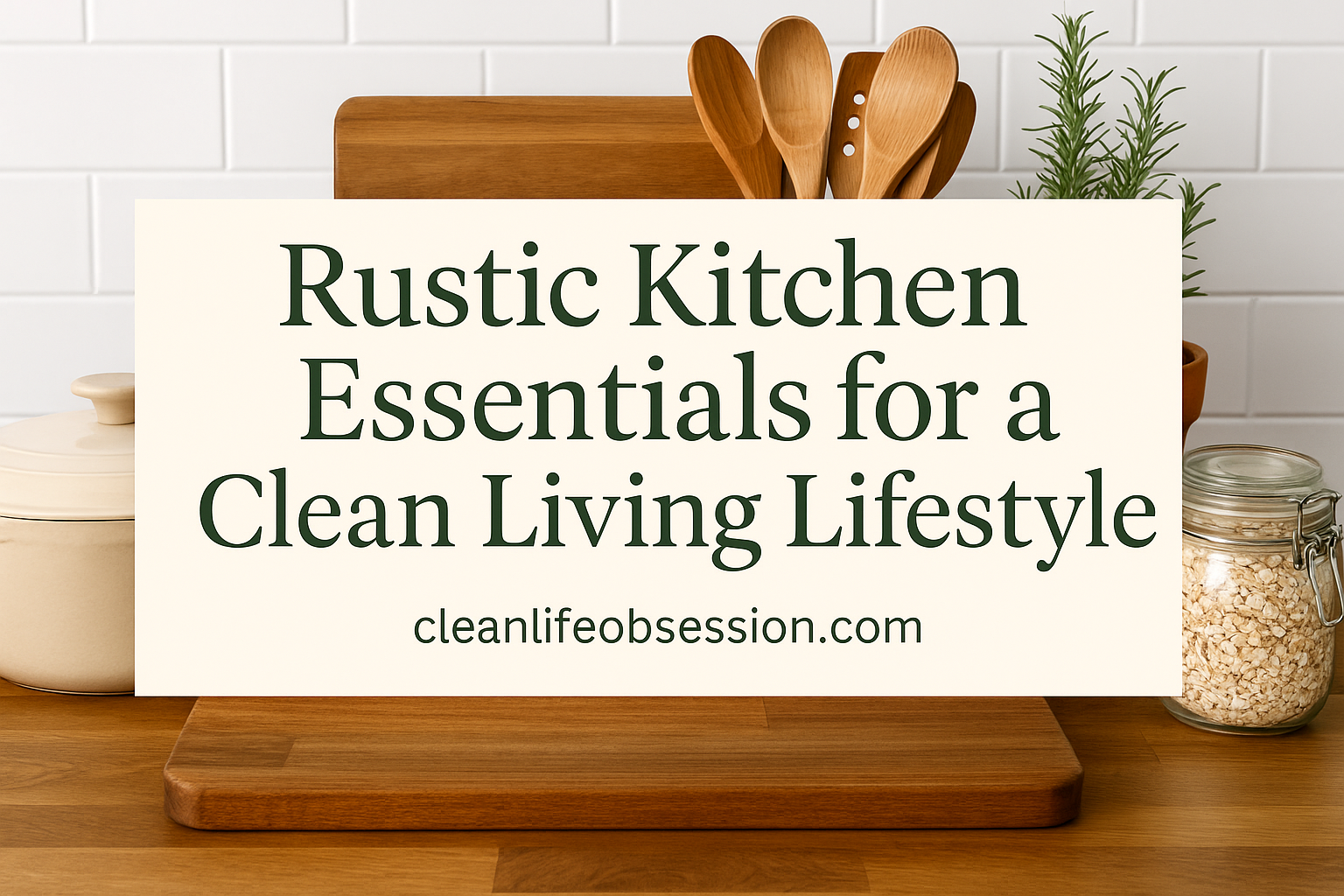There’s something undeniably calming about a rustic kitchen. The warm wood tones, imperfect textures, and natural elements bring a sense of grounding that’s often missing in today’s fast-paced world. But rustic isn’t just an aesthetic—it’s a lifestyle. And when paired with the principles of clean living, your kitchen becomes more than a space to cook. It becomes a sanctuary for health, simplicity, and sustainability.
In this guide, we’ll explore the must-have rustic kitchen essentials that align with a clean living lifestyle. Whether you’re doing a full kitchen overhaul or simply looking to add a few new touches, these tips and product suggestions will help you create a warm, functional, and toxin-free kitchen that supports your wellness goals.
What Is a Clean Living Lifestyle?
Clean living is more than just choosing organic produce or switching to non-toxic cleaners. It’s a holistic approach to health that emphasizes:
- Minimizing chemical exposure
- Eating whole, unprocessed foods
- Using sustainable and ethically made goods
- Living in alignment with nature
- Slowing down and simplifying routines
And your kitchen is the heart of that lifestyle. From the cookware you use to how your ingredients are stored, small details can either support or sabotage your health goals.
Why Rustic + Clean Living Works So Well
Rustic kitchens are inherently closer to nature—think natural wood, stoneware, linen, and handmade items. These elements naturally align with clean living principles:
- Natural Materials: Less off-gassing, fewer synthetics.
- Timeless Design: Less waste, fewer trendy upgrades.
- Simplicity: Encourages mindful cooking and living.
In short, rustic kitchens set the stage for intentional, healthy living.
Rustic Kitchen Essentials for a Clean Living Lifestyle
Here’s everything you need to create a rustic kitchen that promotes clean living—organized by category for easy planning.
1. Cookware Made to Last (and Support Your Health)
Non-stick and aluminum pans may be convenient, but many release toxins when heated. Instead, opt for safer alternatives that also add rustic charm.
 Best Rustic Cookware Options:
Best Rustic Cookware Options:
- Cast Iron Skillet
Timeless, durable, and naturally non-stick when seasoned properly. Bonus: adds iron to your food. - Enameled Dutch Oven
Perfect for soups, stews, and sourdough baking. Le Creuset or Lodge are excellent choices. - Ceramic Bakeware
Free of PFAS, PTFE, and heavy metals. Bonus: they look beautiful displayed on open shelves.
Clean Living Tip: Avoid pans with Teflon or non-stick coatings, as they can release harmful fumes over time.
2. Wooden Utensils & Cutting Boards
Plastic utensils can melt and leach microplastics into your food. Go rustic with wood.
 Essentials:
Essentials:
- Olive wood or acacia wooden spoons (look for hand-carved)
- End-grain wooden cutting board (self-healing and durable)
- Wooden salad tongs or serving spoons
Not only do they feel more natural to use, but they look beautiful stored in a ceramic crock on your counter.
Clean Living Tip: Finish wood with food-safe mineral oil or beeswax to keep them in great shape without synthetic coatings.
3. Clay, Glass, or Stainless Steel Food Storage
Rustic kitchens often showcase open shelving and visible storage, so aesthetics matter just as much as function.
 Ditch plastic and go for:
Ditch plastic and go for:
- Mason jars for grains, nuts, dried fruit
- Clay or ceramic canisters with wooden lids
- Glass storage containers with bamboo lids
- Stainless steel lunch boxes for leftovers
Bonus: These choices reduce plastic waste and prevent chemical leaching.
4. Natural Textiles That Work Hard & Look Beautiful
Say goodbye to synthetic microfiber cloths and polyester oven mitts.
 Rustic-Approved Clean Living Fabrics:
Rustic-Approved Clean Living Fabrics:
- Linen dish towels (naturally antibacterial)
- Cotton muslin produce bags
- Waffle-knit cotton drying cloths
- Hand-sewn linen aprons
Neutral, soft, and highly absorbent, these textiles age beautifully and support slow-living values.
5. Non-Toxic Cleaning Essentials
Cleaning products are some of the biggest culprits when it comes to toxins in your kitchen. And they definitely don’t belong in a clean living space.
 Switch to:
Switch to:
- White vinegar + lemon essential oil spray
- Glass spray bottles with custom blends
- Baking soda for scrubbing pots and sinks
- Wooden dish brushes and natural loofahs
Pro Tip: Make your own all-purpose spray with 1 part vinegar, 1 part water, and 15 drops of lavender or citrus essential oil.
6. Earthy & Handmade Serveware
A rustic kitchen should feel collected—not curated. Think mismatched ceramic bowls, artisan mugs, and handcrafted pottery.
 Key pieces:
Key pieces:
- Stoneware plates
- Hand-thrown ceramic mugs
- Vintage wooden serving trays
- Enamel pitchers or jugs
These items make hosting feel relaxed, grounded, and personal. No flashy finishes—just humble beauty.
7. Plants, Herbs & Windowsill Gardens
Nothing says “clean living” like growing your own food, even if it’s just a handful of herbs.
 Best Plants for Rustic Kitchens:
Best Plants for Rustic Kitchens:
- Potted rosemary, thyme, or basil
- Aloe vera for burns and dry skin
- Hanging pothos or ivy for air purification
Place them in clay pots, hand-painted ceramics, or woven baskets for an extra rustic touch.
8. Intentional Lighting & Ambiance
Rustic kitchens often lean on natural light and layered lighting (vs harsh overheads).
 Lighting tips:
Lighting tips:
- Choose warm-toned lightbulbs
- Add woven pendant lamps or mason jar sconces
- Keep beeswax candles or soy-based tapers on hand
- Dim lighting in the evening to support natural circadian rhythm
Clean Living Tip: Avoid paraffin candles and opt for clean-burning beeswax or coconut wax.
9. Pantry Staples That Reflect Clean Living
Rustic kitchens often have open shelving or visible storage—making what you stock just as important as how it’s displayed.
 Pantry Essentials:
Pantry Essentials:
- Organic grains like quinoa, oats, brown rice
- Dried beans and lentils in glass jars
- Organic spices in labeled mason jars
- Raw honey, real maple syrup, sea salt
- Herbal teas stored in tins or baskets
These items double as both ingredients and décor.
Bonus: Rustic Kitchen DIY Projects
Want to upgrade your space without a full renovation? Try one of these clean-living-approved, budget-friendly ideas:
- Create a vinegar cleaner station with vintage glass bottles and custom labels
- Make your own beeswax wraps for food storage
- Build an open spice rack using reclaimed wood
- Paint cabinets with VOC-free milk paint
- Refinish wooden counters or butcher block with organic oils
Rustic Kitchen Brands We Love (That Support Clean Living)
If you’re looking to shop consciously, here are some well-loved brands to explore:
- Made In Cookware – durable, high-quality pans
- Public Goods – refillable, non-toxic cleaners
- Our Place – toxin-free cookware with rustic flair
- June Home Supply – handmade and vintage kitchenware
- Package Free Shop – clean living essentials and storage
Final Thoughts
Your kitchen sets the tone for how you live, what you eat, and how you feel. Creating a rustic kitchen that supports clean living is about choosing natural materials, toxin-free essentials, and timeless pieces that nourish your space and your body.
And remember: clean living isn’t about perfection. It’s about small, meaningful shifts that bring you closer to nature and your own wellness goals.
So start where you are. Swap out one thing at a time. And let your rustic kitchen become a space that feeds your body, calms your mind, and connects you back to what matters most.






